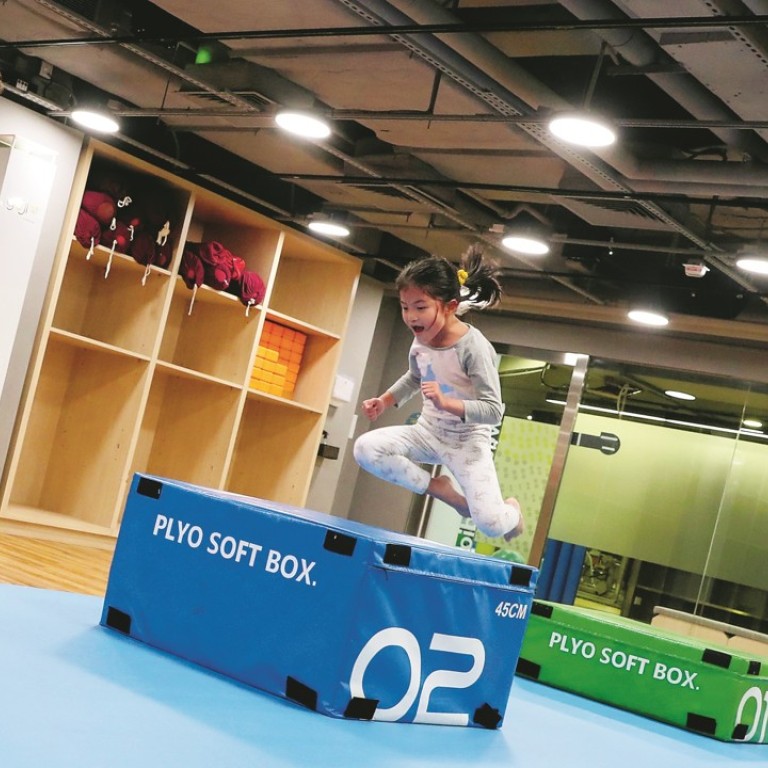
Workouts for kids: how they improve fitness, self-confidence and interpersonal skills
Tertius Steyn’s holistic approach to exercise allows children to develop physical strength as well as social and emotional learning. Meanwhile, One Ten offers workouts for young people in exchange for voluntary work
As Tertius Steyn bounces around an exercise studio at Goji Studios in Whampoa, Kowloon, his young pupils excitedly gather around him, eager to find out what their gym trainer will challenge them to do next.
Instead of lifting heavy weights or running on a treadmill like adult gym-goers, children enrolled in the Generation Goji programme learn to leap, land, roll, throw, catch and run using child-friendly equipment, such as a 20-metre-long inflatable runway and soft boxes.
Steyn was brought in by Goji last summer to devise a children’s fitness programme. At 10 sessions for HK$1,300, the programme is currently available in three Goji locations: Whampoa, Warrior (in Sai Ying Pun), and Causeway Bay for two age brackets: three to seven, and eight to 11.
Former Hong Kong rugby star Ricky Cheuk to run new fitness chain
Tall, loud and bearded, the larger-than-life Steyn lumbers around the room at the Whampoa gym like a troll from a children’s book, making his young participants squeal with excited laughter as he chases them and comically falls onto the soft mat. It’s eight-year-old Annabel’s first time, but she shows no sign of nervousness as she leaps around and attempts to perform a standing jump on a box more than half her height as her mother, Alice Lo Wai-har, looks on.
“Hong Kong students can get so stressed, so after homework I want her to be free,” says Lo, exclaiming “Wow! She’s never done that before,” as her daughter executes a near-perfect forward roll. “We’ve never practised rolling at home – there’s barely space to lie down,” she adds.
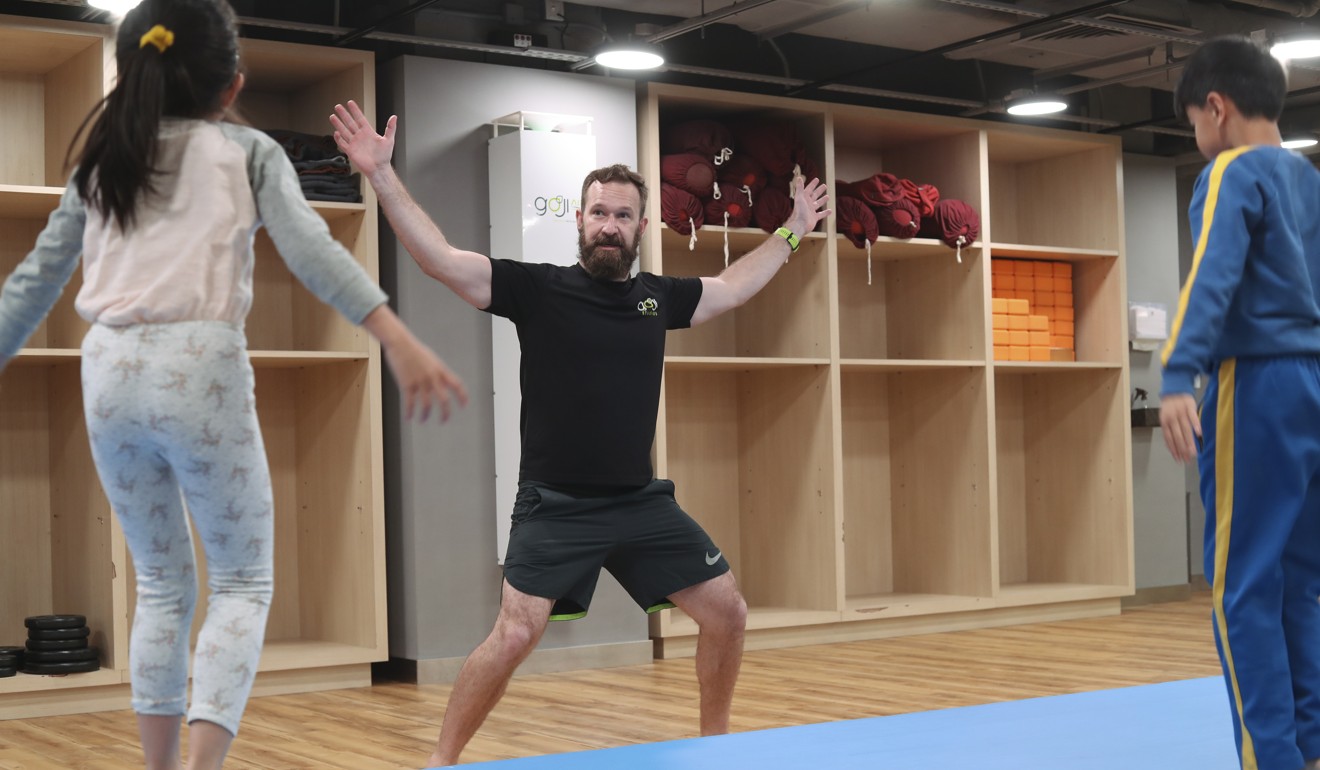
Annabel has one PE lesson per week at the all-girls school she attends. Lo signed her up for Generation Goji not only to encourage her to let off steam, but also give her the opportunity to make friends with boys. Steyn’s style of coaching leverages what he describes as “a holistic approach” to exercise, encompassing social and emotional learning as well as developing physical strength, agility and posture “without fear of judgment”.
Steyn hopes to attract local children from underprivileged backgrounds, who may rarely have the opportunity to exercise for fun.
Prisoners get more exercise time outside than our schoolchildren
“It’s not that they’re living sheltered lives,” he says. “But a lot of these kids coming to my classes have never swum in the ocean or rode a bike. I want the kids that don’t have time to play or do physical things because they’re the kids that need it the most. Johnny, whose parents run marathons, doesn’t need this kind of thing.
“Eddy, who has zero time to do anything else other than go to school, eat his lunch and study at home, I want him to come to my class and experience his first roll. By his fifth class he can do five different kinds of roll, jump like Superman and land like Iron Man.”
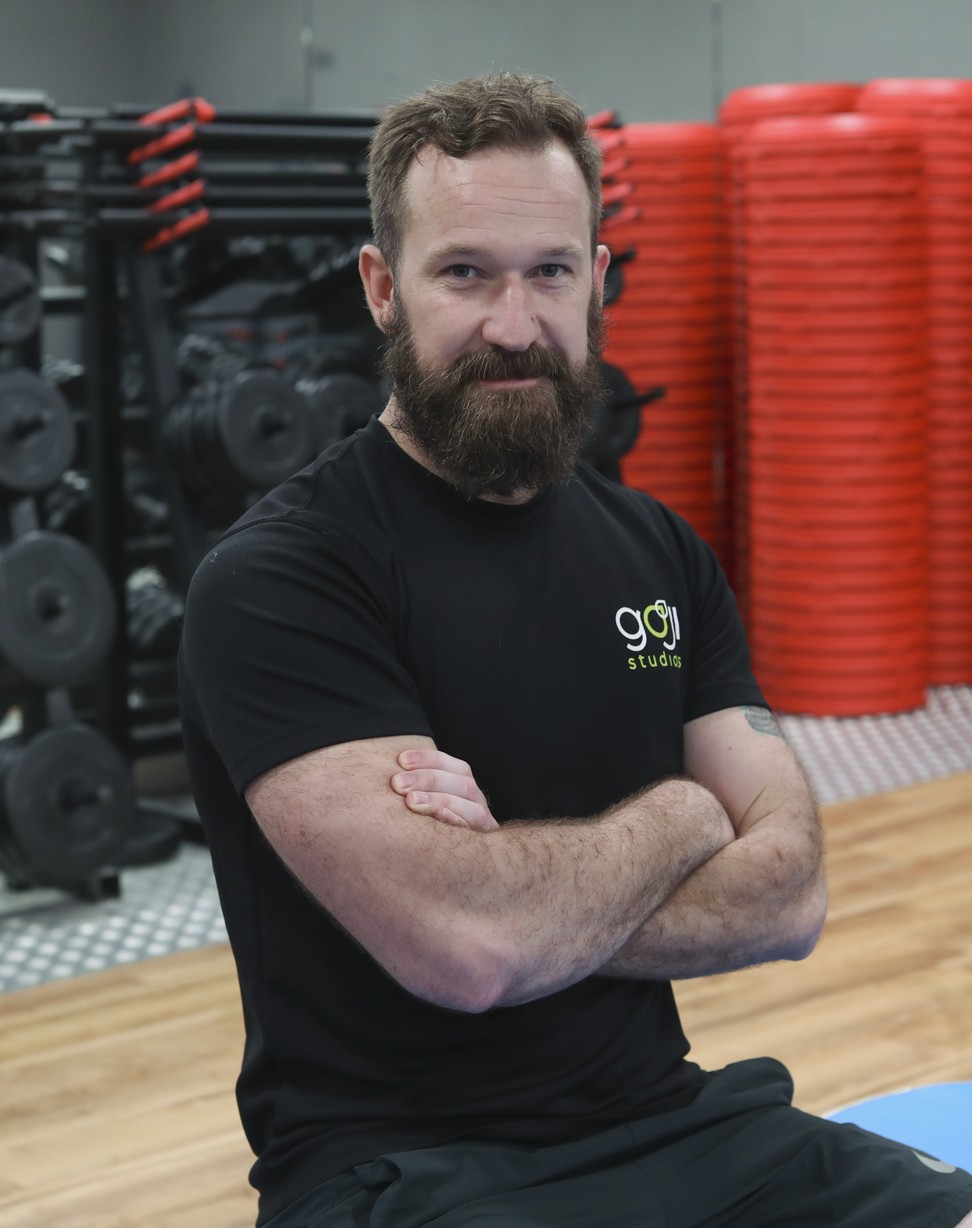
During his six years in Hong Kong, the 34-year-old Namibian-born trainer has worked for several outdoor activity companies, teaching groups of schoolchildren how to kayak, hike, swim and camp. “I’m not really a gym coach, I’m more of a kids life coach,” he chuckles. Having worked with hundreds of local children, Steyn has seen first-hand how long hours sat studying or playing video games is affecting their physical development.
“A lot of the 12- and 13-year-olds I have in my class have the physical development of an eight-year-old. It’s in the way they move … there are little cues that show whether they’ve learned how to walk, jump or run normally. A lot of the kids, all they do is homework; there’s so much pressure on them to perform well in everything they do.”
Not all movements are adversely affected due to a sedentary lifestyle, however, he adds with a frown: “Their fine motor skills – playing on a phone or with a games controller – are perfect.”
All work and no play: mental health problems among Hong Kong kids
The World Health Organisation and Hong Kong’s Department of Health call for children aged five to 17 to “accumulate at least 60 minutes of moderate to vigorous intensity physical activity daily”. In a report published last year, the government stated that the number of children among mental health patients was increasing – by as much as 5 per cent annually.
Meanwhile, a study the previous year found prisoners enjoyed more outdoor exercise than schoolchildren, and that one in five children and adolescents was classed as overweight.
Describing the statistic as “worrying”, the health department warned: “Overweight and obese children are more likely to stay obese into adulthood, often developing life-threatening non-communicable diseases like diabetes and cardiovascular diseases at a younger age.”
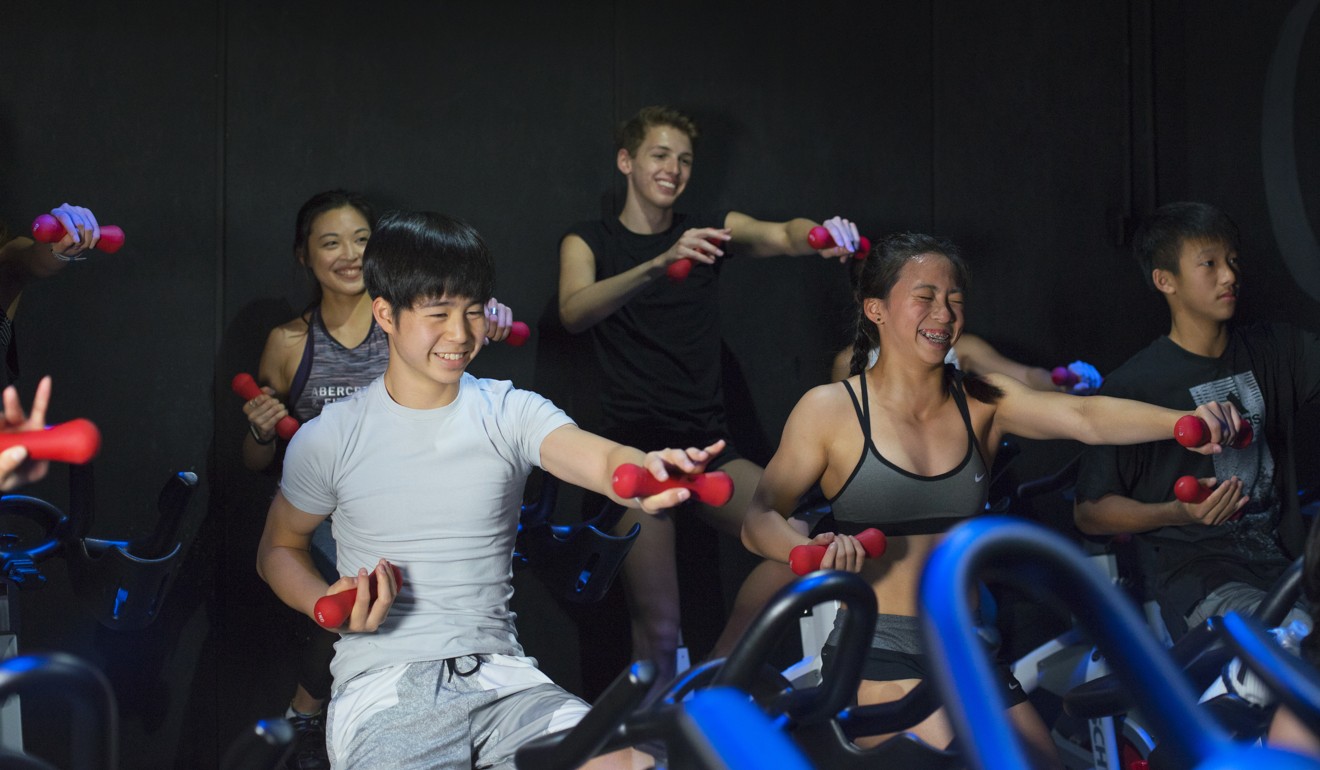
“A lot of parents say they have hyperactive children and pump them full of drugs, but … the issue is that their kid has a lot of pent up energy because they’re not running around enough,” Steyn states.
Some parents’ expectations when signing up their children for Generation Goji can be unrealistic, he adds. “Some parents bring their children to my gym because they want them to be taller and think that exercise will make them taller. I say, ‘There’s no exercise you can do to make you taller but there are certain habits you can form that can make you seem taller, like posture. So I teach them to have a healthy posture – how to pick up something properly and not slouch forward with that mobile phone posture that kids have.”
Touchscreen-addicted children’s hands are becoming too weak to hold pencils
As they grow into teenagers, the problem worsens: at a time when young people are feeling most self-conscious, the stress of increased exams and pressure to get into university can mean exercise becomes an even lower priority.
Local social enterprise One Ten hopes to “empower young adults of Hong Kong through exercise”, with a model that, in part, offers exercise classes in exchange for volunteer work through a partnership with Hong Kong charity Time Auction.
“People tend to start exercising with an exterior standpoint – I want to lose weight, gain muscle,” says One Ten programme director and instructor Ada Cheung. “But once they participate in the class, they realise there’s an internal transformation. A boost in endorphins, adrenaline energy levels are the bonuses.”
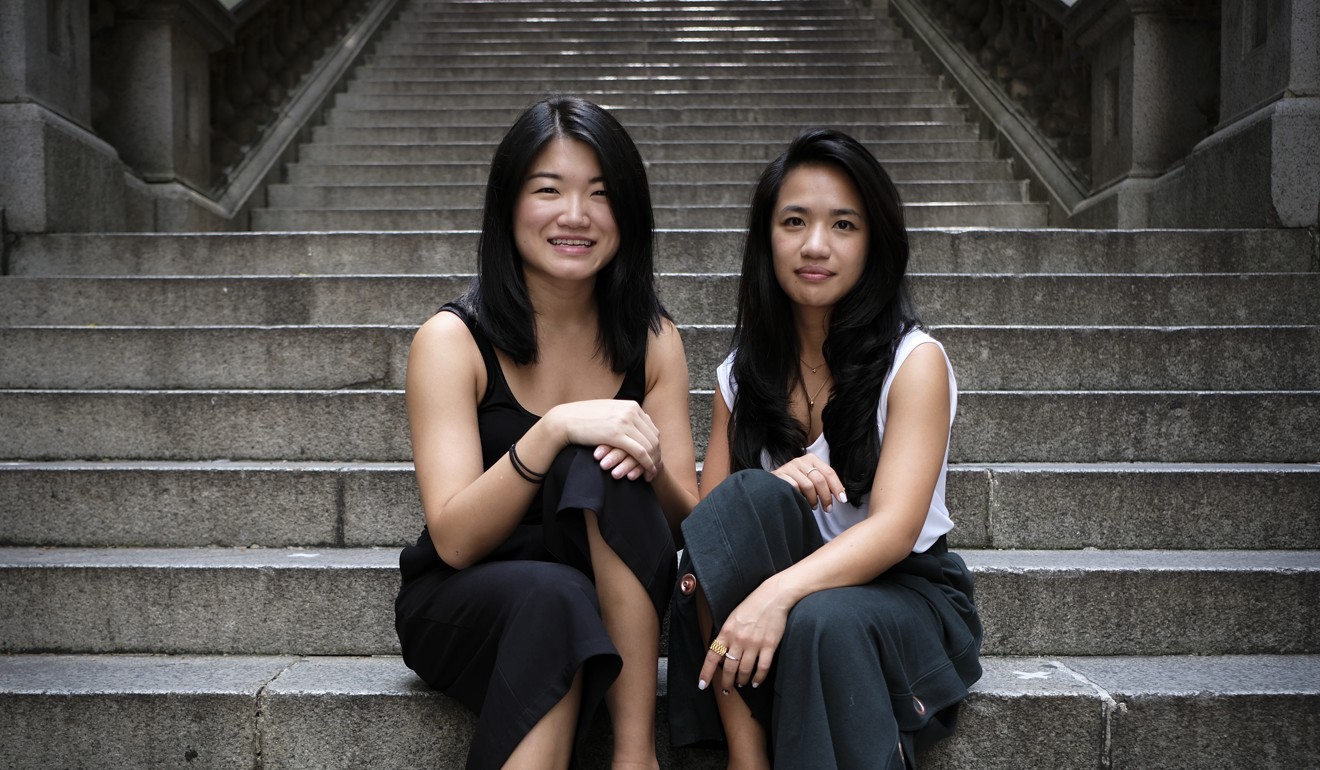
One Ten focuses on the people aged 14 to 22 “because in Hong Kong, and all over the world, being a teenager is hard. There are stresses and problems: everything from body consciousness and self-esteem to academic, societal and cultural pressures,” Cheung continues.
“So many changes happen when you’re a teenager, and when you’re moving on to university. Not only hormonal and physical changes, but also setting your direction in life. Through One Ten, they can form a strong grounding and foundation for the rest of their life, honing lifelong skills.”
Fitness network to equip Hong Kong youngsters for life’s hurdles
Engineered carefully to include all backgrounds and social brackets, One Ten’s model works by offering young people three routes into exercise: volunteering – where community service hours earn workout credits, sponsorship by companies that want to support young people, and paid classes at a special rate.
Teens and young adults can choose from a range of indoor and outdoor exercise options, including spinning classes at XYZ, high intensity interval training (HIIT) sessions with F45 Training, and yoga at Sheung Wan studio Kita Yoga.
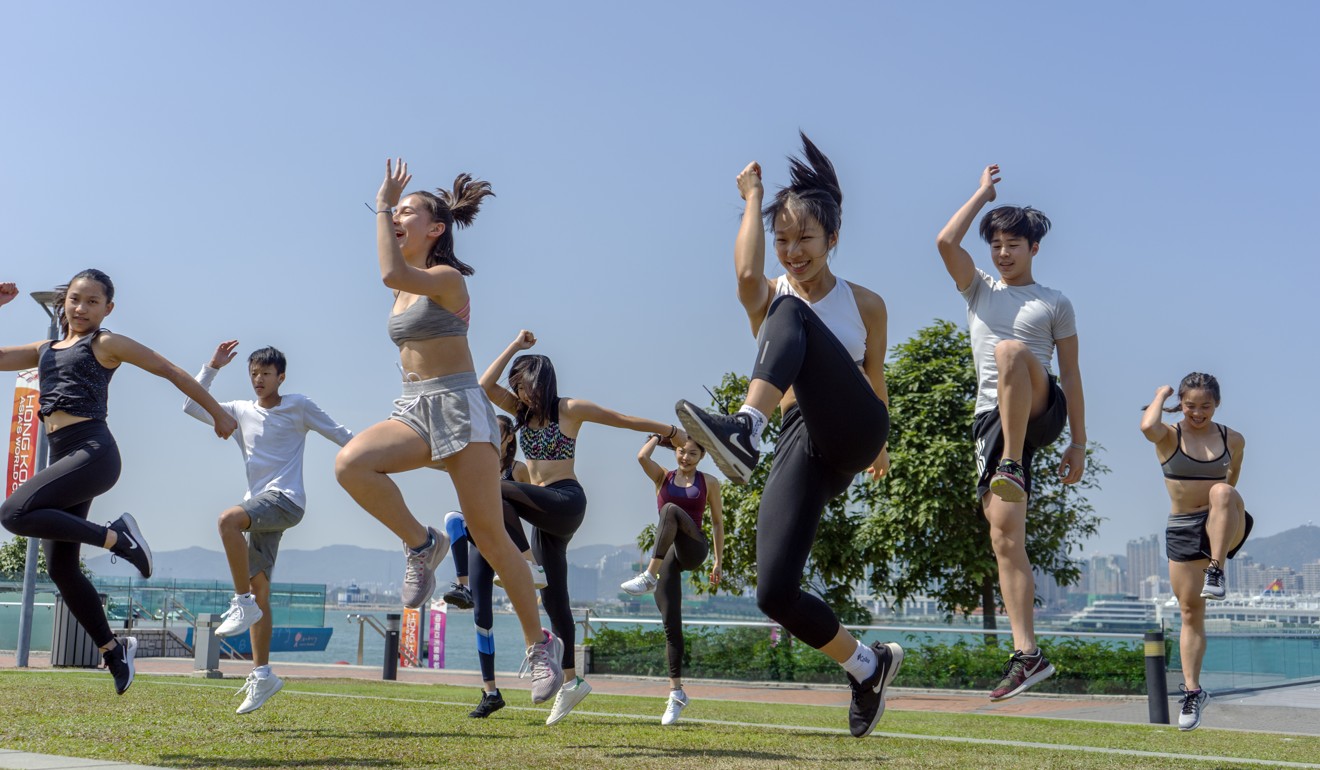
“They’re the same young adults facing the same problems. We want them all to have the same benefits,” says Dionne Lee, One Ten’s communications director. “There’s nothing else like this in Hong Kong at the moment. It connects young people and gives them access to things they wouldn’t otherwise get. Especially in the 14 to 22 age range – they need the support system.”
Fit & Fab: Belinda Koo
Started by banker, exercise entrepreneur and Time Auction mentor Belinda Koo, who also founded XYZ, One Ten, like Steyn’s Generation Goji, prioritises self-discovery and challenges in a non-judgmental environment.
“The cool thing about One Ten is that it’s not competitive – we take the competitive element away,” says Cheung.
“In the HIIT class a lot of exercises are done in pairs. We’re working with each other; not against. Through that experience, you can go back into the competitive world with a renewed mindset.”
When it comes to parents understanding what their children want, simple communication is key, both Generation Goji and One Ten agree. “A lot of parents do listen to their children; if their child is happy and had a good experience and goes home with a big smile on their face, that’s usually the biggest convincing factor,” Steyn surmises.
At the end of the session at Goji, the children collapse breathless on to the mat to sit with their trainer. “Put your hand on your heart, what do you feel?” asks Steyn. Annabel giggles: “Happy.”

